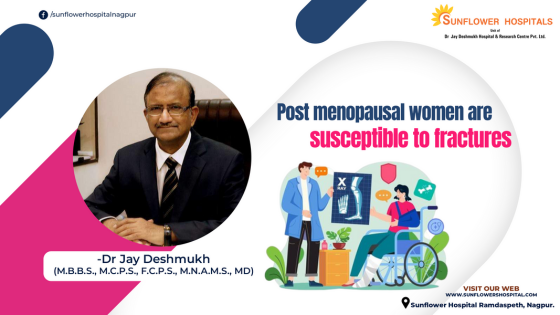Is menopause a disease?
It is a normal biological process. However, the physical symptoms of menopause may cause anxiety, depression, lack of sleep, and hot flashes. It can lead to obesity and an increased risk of cardiovascular illnesses.
What are the symptoms leading to menopause or premenopausal symptoms?
Irregular periods, vaginal dryness, hot flashes, night sweats, sleep deprivation, mood changes, lethargic feeling and weight gain, loss of breast fullness and dry skin and thinning of hair are the most common symptoms. In the peri menopause state if you skip a period a urine pregnancy test may be required.
What are the causes of menopause?
As a woman approaches her late 30s, the ovaries start making low oestrogen and progesterone. The fertility declines. At an average age of 51 years, the ovaries stop producing the eggs and there are no periods. If the ovaries are removed, there will not be menses and hot flushes and sweating may occur early. If only the uterus is removed, the symptoms of menopause occur late. Primary ovarian failure can occur due to genetic or autoimmune disorders. Hormone therapy is indicated in these women.
What about osteoporosis ?
Post-menopausal women are susceptible to fractures of the wrists, spine and femoral head. This is due to thinning of bones. Specific treatment is indicated under your doctor’s supervision as the treatment may vary from woman to woman.
What about urinary symptoms?
Frequent sudden strong urge to urinate is common. Involuntary loss of urine while coughing, sneezing, or laughing is common. The incidence of urinary tract infections would increase. Hormonal therapy may help.
What about weight gain after menopause?
A low-calorie diet is essential. Avoiding a high-calorie, high-carbohydrate diet is important.
How to diagnose menopause?
Certain hormones like blood FSH increase during menopause and oestrogen levels are very low to absent. However, these tests are not generally necessary.
What are the medications useful in menopause?
Hormone replacement therapy is most effective in the treatment of most symptoms of menopause. They may be used during the first few months of menopause. If the uterus is present, progesterone is added to prevent bleeding. Vaginal oestrogen, low-dose antidepressants, Gabapentin and daily administration of Calcium and Vitamin D, adequate sun exposure and exercises are very important. Some multivitamin supplements may also help.
What about sexual function?
Loss of desire for sex is common. Vaginal dryness further adds to the problem. Local vaginal oestrogen-containing creams may help. Regular exercises and physical fitness may help.

